Overcoming Practical Pessimism
Devra Torres | Aug 29, 2012 | 23 cmts
“Remember! Inside every silver lining is a dark cloud of despair!”

(Many thanks to Richard West for this photo. For more of his very striking and varied artistry, please see more of his work here.)
I knew a wonderful grandmother whose take on life could be captured in those words. I couldn’t figure it out—until I became a mother. Part of being responsible for someone you love is being on continual alert for anything that could possibly go wrong. The world is suddenly full of death traps. A grape on the floor—choking hazard! A hitherto harmless pet—smothering hazard!
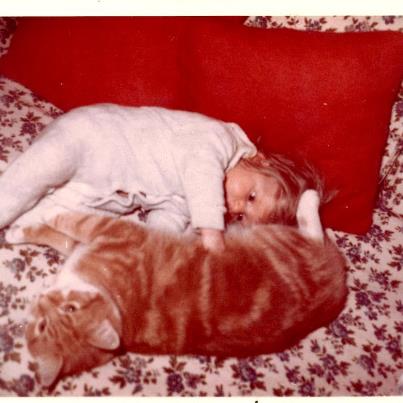
And later: your daughter’s boyfriend—lifelong-misery hazard!
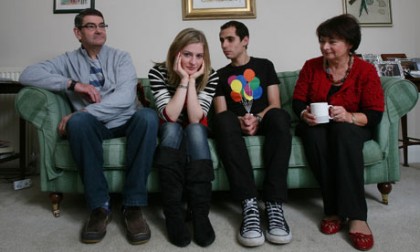
But it’s not only panicky mothers who tend to look on the dark side. Some take a chronically dim view of their own domestic situation; others brood more about the larger geopolitical or economic picture. But we all exhibit a largely unexamined tendency to think of sad situations, malicious intentions, tragedy, and danger as being more real than goodness.
Of course, ontologically, it’s the other way around. Thomists and phenomenologists may quarrel over whether the concept of privation

does justice to the reality of all forms of evil.
But we can all agree that good and evil aren’t two coequal principles. Whatever reality evil may be said to have, it’s derivative. It’s not on a par with the Good, the True and the Beautiful. It’s certainly not more real than they are.
Still, in practice, it’s eerily easy to slip into feeling, and acting, as if goodness were less real. We practice pessimism and call it realism. (Being deep into election season only exacerbates the tendency.)
It works like “practical atheism,” a term I learned from Prof. Rocco Buttiglione.

The number of theoretical atheists may be on the rise, but they’re still rare. Practical atheists abound, though: people who think they think God exists, but live as if He didn’t. If you “believe in” Him but never worship Him, apologize to Him, thank Him, or request His help, you might as well be an atheist.
Similarly, if you theoretically hold that God is omnipotent—or at least you're fairly sure He's competent to pull off the Final Victory—
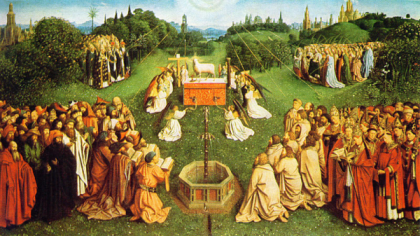
but find yourself consistently ignoring or making cynical cracks about every good thing that happens, you might have slipped into “practical pessimism.” This is very, very easy to do.
Why is that?
I think there are at least three reasons for this tendency to give evil more ontological credit than it deserves.
- Efficiency. If things are going badly, you’re obliged to do something about it. If they’re running smoothly, you can move straight on to a fire that does need putting out. If you fail to notice something good and give thanks for it, no obvious calamity ensues--whereas if you fail to address a medical or financial or political crisis, disaster does strike. So we keep our eyes fixed on the crises.
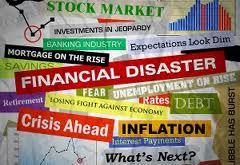
- Commercialism. With a 24-hour news cycle, run by people who live by “If it bleeds, it leads,” we're inundated with depressing stories. We think of news as a service, forgetting that it’s a product. Before “We report—you decide” comes “We decide what to report.” News of tragedy and danger is obviously important, but an exclusive and steady diet of it can skew our outlook.
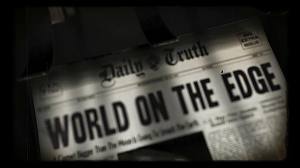
- Original sin. More difficult to pinpoint and take seriously, but closer to the root of the trouble, is the third reason. The devil wants us discouraged. Our fallen nature plays into his hands, accepting pessimism as its default state. And, as Jacques Philippe points out (I think in Searching for and Maintaining Peace) discouragement is a greater danger to our salvation than sin is. It’s counterintuitive, but true: so long as you don’t despair, you can recover from any sin. But if you give up, you can’t, and even continual low-grade melancholy hampers our ability to perceive goodness and hope for its victory.
So here are some counter-strategies:
- Make a point of cultivating gratitude, so as to notice good things at all. It has been shown, if you believe in studies, that even as minimal an effort as writing down five things a week that you’re grateful for has enormous benefits. This involves no self-deception or pretense that evil doesn’t exist or doesn’t matter: it’s just a deliberate shift of focus.
- Even if all the bad news were true--a silly assumption--it doesn't take a lot of research to unearth positive counterparts to it. For example, did you know that 100,000 people a year are converting to Catholicism in China? Did you know that Christianity is now the majority religion in Africa?

- And that six million Muslims convert to Christianity each year? (I was startled enough by this one one to check it, and I don’t know for sure, but I saw it repeated in source after source, both Muslim and Christian.) Did you know that worldwide poverty is falling?
 And that divorce is on the decline? In short, there’s a lot of good news we’re not hearing about. We need to keep that in mind.
And that divorce is on the decline? In short, there’s a lot of good news we’re not hearing about. We need to keep that in mind.
- Remember that original sin weakens the will and darkens the intellect. As hard as it is for us to acknowledge that we’re weak and sinful, we're even more reluctant to realize that we don’t know what we’re talking about. It’s the easiest thing in the world to forget that we utterly ingorant of the vast majority of the variables relevant to how the world is coming along. So keep hold of your Socratic ignorance, and don't follow the opinion-makers.

- Do listen to your grandmother, and go ahead and be vigilant about stray grapes and fluffy cats and iffy boyfriends. But don't overlook the silver lining.

Comments (23)
Marilyn Prever
Aug 29, 2012 8:47am
Just what I needed today. Thank you! You have a light touch and use your education well.
Devra Torres
Aug 29, 2012 11:33am
Well, most of my education was from you! You're the one who taught me that anxiety isn't from God, even when there's "good reason." And it also made a big impression on me once when I was looking for something I had lost, and you suggested I should pray that I'd find it. I acted very annoyed, and you got mad that I wasn't treating praying like something that could possibly accomplish anything. I was acting like a practical atheist.
Pete
Aug 30, 2012 5:52pm
Or contrarily, the practical pessimist brings awareness to the otherwise hidden ontological shadow of original sin, a derivative of God, often resisted, overlooked or denied by humans due to fear, ignorance or lack of humility.
Of which, with courage, self-knowledge and humility this shadow becomes accepted, integrated and finally embraced and recognized as representing the real dilemma of the human condition, wherein lies the abode of all potential evil.
Yet, it manifests as our deepest vulnerability and as such, in Christ, becomes our greatest strength: That is, by living from this strength in Christ, we are imbued with a truly authentic spirituality resplendent with humility, compassion, courage, beauty, redemption and truth.
All of this goodness is wrought by the practical pessimist’s stubborn negativity, insisting on bringing awareness to the ontological dark cloud within its silver lining, and is often resisted if not criticized by optimists either for fear of it treading on their God, by ignorance of it as the fallen aspect of their ontology, or by the arrogant stance they take in resistance to it.
deb
Aug 31, 2012 1:45am
Thanks Devra. I once heard statistics stating that people who listed three things they were grateful for everyday, were happier and less likely to have depression. So everyday at the end of our family prayer time, we used to have each person name three things they were grateful for. This probably would work best at dinner time since it often led to great conversation and laughter. Also bc our family is large, this lasted for about an hour to 40 minutes! After reading this blog, I've restored this habit, but we name one thing rather than three. Conversation and laughter continues, and we have the ocassional child who wants to list more, God love them. I've managed to hold firm so that the children can go to bed at a decent hour..theoretically anyways. Maybe they are doing it on purpose just to stay up longer? Oops! That was rather superstitious of me! But I still tell my daughters not to go to the gas station at night, and while I've resigned myself to expect each child's angel to intervene, I still sometimes worry about those pennies that always seem to be on the floor no matter how diligent I am.
deb
Aug 31, 2012 8:29am
I meant "suspicious", not "superstitious". Stevie Wonder's song was going through my head and I was tired, having been up late working on home schooling stuff.
Devra Torres
Aug 31, 2012 11:41am
Pete, thank you for the very thoughtful comment, which, if I understand it, I agree with. Yes, the pessimism can be the source of all that self-knowledge, humility and strength, IF it's seen for what it is, "from the outside." Then it can provide a "third way" between the kind of pessimism that drags the person down and the kind of optimism that cuts him off from the truth about his fallen condition.
My only reservation is the part about "embracing" and "accepting" the "shadow." But if you mean it as I think you do (not knowing you personally, unless you're Pete Colosi!)--as in what St. Paul's talking about when he says he rejoices in his weakness--then I agree with that, too.
I think something that few people have wrestled with is the idea that "all things [even sin and evil] work together for good for them that love God." I've found it in Jacques Philippe and Michel Esparza--actually, I don't doubt that many people have wrestled with it throughout the history of philosophy and theology and theodicy--but I don't think a right understanding has trickled down to many of us today. Let me know what yuu think!
Devra Torres
Aug 31, 2012 11:46am
Deb, that's a wonderful habit, and I think I'll try to institute in in our family. I can't tell you how happy it makes me when something I manage to write and post leads to someone instituting, or reinstituting, some wonderful tradition like that. The study I read said gratitude is good for physical health, financial health, attaining all kinds of goals, interpersonal relationships...and even if it weren't, of course, it's just a matter of justice to bother noticing all the good things we're showered with, without falling into a fake optimism which denies or minimizes evil.
Pete
Aug 31, 2012 2:03pm
Yes Devra, the shadow I've made reference to is a metaphorical depiction of the derivative of God which you referred to that we as humans are ontologically bound to, namely, original sin - in other words, we are not God and to accept and embrace this vulnerability of ours is where we find our salvation in Christ.
The reason why I used the word shadow in my depiction of original sin for one was in reference to Plato's cave analogy and neoplatonic thought. I probably could have done a better job at conveying that. The other reason I used it is because many optimists these days, I think, for many reasons which I listed in my post, condemn this inherent vulnerability in the human being's ontology and favor a less true ontology that lacks this vulnerability component. They therefore miss out on the central thesis of Christianity - the very thing they champion is sorely misunderstood and it leads to grave error (and even non-Christians who for the many reasons I have listed find their souls in quandary or upheaval).
I really learned this idea from Flannery O'Connor. Her novels and many short stories have this over-arching theme in them.
Pete
Aug 31, 2012 2:14pm
I'm not your friend Pete Colosi, but I appreciate your range of knowledge in philosophy and theology! I am more of a life long learner of these things and love every minute of it. I am not an expert on anything but find it helpful for my own growth to speak my mind and engage in thought provoking dialogues with others on these topics.
Thanks for your post.
Katie van Schaijik
Aug 31, 2012 4:11pm
Devra, being melancholic in temperament and Irish in ethnicity, I am severely prone to the blues. I remember feeling assaulted by anxieties about my babies' futures almost the minute they were born. When anyone is late coming home, I begin picturing the worst.
I'm so grateful that every mass includes a prayer against worry: "Delivers us, Lord, from all anxiety".
I loved an insight of Newman's: Although error and evil seem to make such great strides, we forget that truth has a force and a staying power that they lack. Truth may be slower and more hesitant in debate, because it's more cautious. It won't be glib. But falsity lacks the heft of truth over time.
Sometimes I think pessimism is a psychological strategy. If things go badly, you have the satisfaction of having predicted it and prepared for it. If they go well, you have the pleasure of surprise.
Pete
Aug 31, 2012 7:06pm
In answer to your question Devra, I would have to say I don't know.
My main point in my post was to show that we don't have to be afraid of who we truly are.
The reason I included evil as taking up it's abode in our fallen nature was to show where it exists, and to know this is the first step in avoiding it. Yet, it resides in the same place we must accept ontologically. Moreover, I think mostly, evil is the result of unresolved or unconscious early childhood trauma, which does not excuse it, but makes it more clearly understood.
The next step in avoiding it is choosing the good. I think evoking love (Christ's love if you will) is the best antidote for choosing this good. I think when a person is acting out evil, they are reacting to the unconscious repressed feelings within their body. In a loving environment, for the first time they find the courage to work through the process of becoming conscious of their repressed true needs and feelings. I see the love to be a catalyst which orients their soul to the good and emotional honesty to be the healer.
Devra Torres
Sep 1, 2012 7:27pm
Pete, yes, Flannery O'Connor is a master (mistress?) of that theme! Once we can recognize ourselves in a warthog from Hell, then God can get somewhere with us!
I'm not quite sure about referring to evil as being ontologically part of us is right--it sounds almost Calvinist, or like the theory of total depravity, or like the Lutheran idea of our sinful nature being not transformed, but only "covered." I just mean that since sin was not originally part of our unfallen nature--even though we can't escape original sin by any power of ours--it doesn't seem like it's "part" of us in the same way, for example, free will is.
I have no background in psychology, so I'm not sure about what you say about evil being the result of unresolved or unconscious early trauma--as a mother of eight, I have a prejudice against the idea--just meaning that I hope it's not true! because it would mean such a daunting responsibility for the mother, who the children depend on so much in early childhood. But that's not an argument against it!
Devra Torres
Sep 1, 2012 7:29pm
The role of the body in this is interesting, too, and the way affectivity sometimes gets reduced to, or treated as, a merely bodily reality. But maybe that's grist for a whole 'nother post.
Devra Torres
Sep 1, 2012 7:59pm
Katie, I know! We had a priest once who would change it to "deliver us from all needless anxiety" (and it's "distress" in the new translation anyway, but what it really said was all anxiety, and that was right. And yes: truth can't be reduced to a sound byte, so sometimes it seems to get the worst of the argument, even though it hasn't really been defeated. I have used pessimism as a psychological strategy, too--expect the worst, and at least you won't be surprised, except happily--but I think the danger is, you're focussed on evils, both real and imaginary, and you can lose perspective.
Pete
Sep 1, 2012 8:42pm
Devra, I would say that evil is not a part of our ontology, and that original sin is. I believe we have a choice from free will to choose evil or good as I stated in my post above.
I do not believe evil is up for candidacy as a component of our ontology as you referenced in your post. I believe evil and original sin are two very different things in themselves.
In your post, you were contrasting good and evil, whereas in my post I was contrasting original sin and the good, or God, where original sin is the shadow I had depicted and the good, or God being the other ontological component.
And, as Flannery O'Connor grotesquely, yet cryptically illustrated through her characters, you better believe original sin is part of your ontology or you'll find yourself playing God and loosing your soul.
In The Violent Bear It Away, O'Connor illustrates this in Rayber, the father of the developmentally disabled boy. Rayber is an atheist who looses sight of his fallen nature, whereas Francis Tarwater understands himself in no other way but fallen, and despite his pessimistic murderous ways, he pursues Christ through his fallen ontology.
Devra Torres
Sep 1, 2012 9:12pm
Pete, I did just read it again and I see what you mean. I misunderstood what you said about being "ontologically bound to...original sin" as meaning that evil was somehow part of our ontology. And you certainly didn't seem to be denying free will, on the part of those who have suffered early trauma or anyone else, so I was confused.
Pete
Sep 1, 2012 9:31pm
Also, in O'Connor's Wiseblood, Hazel Motes comes to this understanding and finds redemption, only after many failed attempts at resisting this truth within himself.
And, I said that I see evil as mostly, the result of unresolved or unconscious early childhood trauma, and by saying this I mean that even if we do have this, which most of us do in varying degrees, we can still choose good. We can resist these impulses, and love helps us do this all the time, but emotional honesty is the only thing that transforms this potential evil in an enduring way.
It's potential evil because we still have a choice to act on our unconscious childhood emotional trauma as in committing acts of evil, or we can choose the good. We always have free will, but because these emotions are repressed and unconscious, they manifest as invisible enigmas in the world and we have never been able to put our finger on them. But once we act on it, then the evil is no longer potential and it becomes visible.
Pete
Sep 2, 2012 2:42pm
Devra, I hope a correction to my post #8 will clear up any more possible misunderstandings:
In the first part of the first sentence of post #8 I made the reference (in error) to your "derivative" of the Good (which I called God in my post), thinking you were comparing original sin with the Good, when in fact you had compared evil with the Good and claimed it was derivative.
So, for the record, please omit the reference I made to the derivative of the Good in your post, (which I called God in my post). Thanks!
I apologize for causing any confusion and I hope that clears up my post.
Devra Torres
Sep 2, 2012 3:05pm
Pete, no apology is necessary at all, but that does clear things up in my mind a little more!
Pete
Sep 2, 2012 9:13pm
Also, I don't think it was just by coincidence that the "ugly girl" pessimist in O'Connor's short story, Revelation, was reading a book entitled, "Human Development" before she threw it at Mrs. Turpin, and before calling her a Warthog from Hell, as you mentioned.
But, that story, like a lot of her others, was about racism too:
As when Mrs. Turpin has her vision of all the different kinds of souls in procession towards heaven and her kind, the only one's who were actually singing in key were shocked because their "virtues" were being burned away.
Such a brilliant soul that Flannery O'Connor.
Devra Torres
Sep 2, 2012 9:20pm
"She would of been a good woman if it had been somebody there to shoot her every minute of her life."
--A Good Man is Hard to Find
I had the good fortune of having a mother who read me Revelation when I was a teenager and have been hooked ever since.
Richard West
May 11, 2013 2:44am
Hi, if wish to use my foto without licence, please can you give attribution to myself.
http://www.flickr.com/photos/richardwest/1155120782/
A simple thankyou link to rbwestphoto.co.uk is plenty and helps and artist like myself get credit for my work.
Thanks,
Richard
Devra Torres
May 11, 2013 11:19am
Richard, I'm very sorry, and have added an attribution within the post. I've checked out more of your photos at the address you link to--here--and was very struck by the beauty and variety of your work.